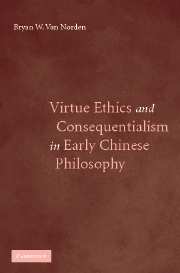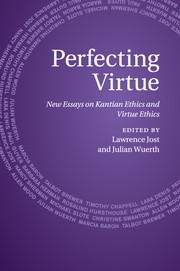Virtue Ethics and Consequentialism in Early Chinese Philosophy
In this book Bryan W. Van Norden examines early Confucianism as a form of virtue ethics and Mohism, an anti-Confucian movement, as a version of consequentialism. The philosophical methodology is analytic, in that the emphasis is on clear exegesis of the texts and a critical examination of the philosophical arguments proposed by each side. Van Norden shows that Confucianism, while similar to Aristotelianism in being a form of virtue ethics, offers different conceptions of 'the good life', the virtues, human nature, and ethical cultivation. Mohism is akin to Western utilitarianism in being a form of consequentialism, but distinctive in its conception of the relevant consequences and in its specific thought-experiments and state-of-nature arguments. Van Norden makes use of the best research on Chinese history, archaeology, and philology. His text is accessible to philosophers with no previous knowledge of Chinese culture and to Sinologists with no background in philosophy.
- Straddles the methodological divide between Sinologists and philosophers
- Contains the best contemporary research on ancient Chinese language, history, archaeology, and philology
- The most systematic and sympathetic exposition of the classic debate between Confucians and the Mohists
Reviews & endorsements
"...Bryan Van Norden has made a remarkable and thought provoking contribution to a still ongoing dispute about the dao... strongly recommend the book to anyone with an interest in Chinese philosophy and comparative philosophy."
--Loy Hui-Chieh, Department of Philosophy, National University of Singapore, Dao: A Journal of Comparative Philosophy
"Bryan Van Norden's Virtue Ethics and Consequentialism in Early Chinese Philosophy is a major contribution to the philosophical study of early Chinese thought.... It is a work of enormous scope that attempts to understand three key figures in the early Chinese philosophical tradition: Kongzi, Mozi, and Mengzi.... this book helps advance the debate on the questions of Ruism as a virtue ethics, the place of truth and argumentation in classical Chinese thought, and the relevance of Ruism to contemporary ethics. Van Norden's book is a highly important work, and one I suspect scholars in the field will be engaging with for years to come."
--Alexus McLeod, University of Dayton, Philosophy East & West
Product details
June 2007Hardback
9780521867351
430 pages
229 × 152 × 29 mm
0.71kg
Available
Table of Contents
- 1. Introduction
- 2. Kongzi and Ruism
- 3. Mozi and early Mohism
- 4. Mengzi
- 5. Pluralistic Ruism.






